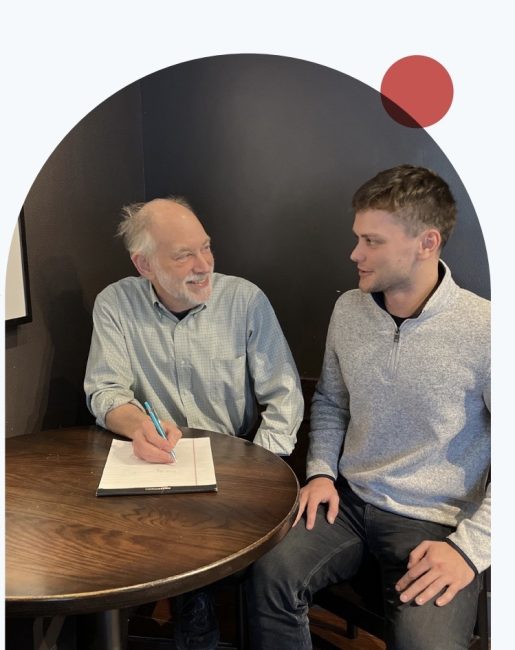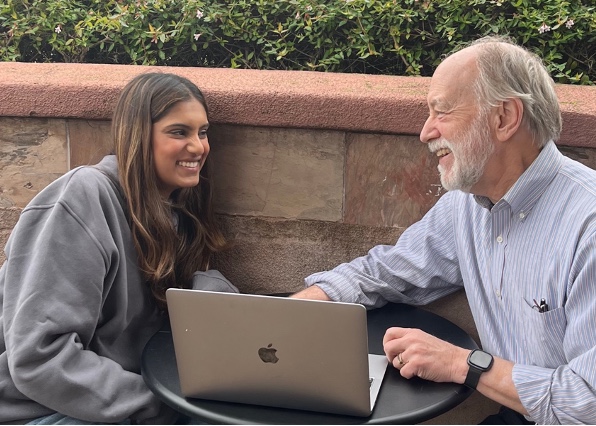Finally, a college prep book that
actually prepares students
for college!
"The book. . . teaches the reader how to learn better. It's a worthy endeavor and a valuable one for those industrious enough to make their way through these chapters. . . Those who do will undoubtedly have a leg up in their first semester.
A functional, low-frills guide to critical thinking for rising college freshmen."
--Kirkus Review
A functional, low-frills guide to critical thinking for rising college freshmen."

Nearly every first-year college student discovers that college courses are more academically challenging than they expected, and certainly harder than classes in high school. Professors expect students not just to absorb material, but to analyze and synthesize it, to consider multiple perspectives, to evaluate conflicting evidence, and then to apply what they’ve learned in new contexts.
Thinking Critically in College explains how to do all this and more.
Unlike most college prep books—which advise you to go to office hours, get enough sleep, take good notes, and learn how to get along with your roommate—this one actually shows you how to do the work your professors will assign and explains how to tackle common academic challenges. This accessible and comprehensive handbook covers metacognition (thinking about how you think); basic critical thinking skills; college-level reading, writing, and quantitative reasoning; how to think about academic disciplines; decoding actual assignments from college courses, and tackling research projects.
Lee Cuba, Professor Emeritus of Sociology, Wellesley College, and author of Practice for Life: Making Decisions in College
Written in a personal, engaging style that draws on the author’s experience as a professor and academic advisor for nearly forty years, Thinking Critically in College is an indispensable guide to doing the work of college for students from all academic backgrounds.

Features of the Book:
- Written directly to students in an accessible style
- Addresses the unique concerns of first-gen students
- Incorporates the latest insights on the science of learning
- Interactive exercises throughout
- Utilizes actual college assignments from a variety of disciplines
- "Advice for the Road Ahead" mini-essays on the qualities to cultivate for college success
- Key takeaways for each topic clearly identified
- Summaries at the beginning of each chapter
- Questions for Reflection after each chapter
Order your copy of Thinking Critically in College now through
Praise for Thinking Critically in College

“Thinking Critically in College details and exemplifies the differences between high school and college. Students who read this book before coming to college will have an advantage over those who don’t.”
Lee Cuba
Professor Emeritus of Sociology, Wellesley College, and author of Practice for Life: Making Decisions in College

“Even students who have taken college-prep and AP courses are unprepared for the type of learning that will take place in college. Thinking Critically in College is poised to help all students at all types of institutions develop the dispositions and skills necessary for success in college.”
Lynn Pasquerella
President of Association of American Colleges and Universities (AAC&U)

“No other ‘how-to-do-college’ book takes a deep dive into what it takes for college students to thrive academically and cultivate the habits of an educated mind. Newman offers a treasure trove of helpful examples to illustrate how undergraduates need to think and what they should do to effectively meet the learning challenges they will encounter during and after college.”
George D. Kuh
Chancellor’s Professor Emeritus of Higher Education, Indiana University

“What college students could surely use now is an owner’s manual of sorts, to ensure they are well-prepared to get the most out of the next four years. Drawing on his deep expertise and experience in the delivery of an array of student support services, Louis Newman has taken on the challenge of writing just such a book, which is desperately needed.”
Jacques Steinberg
New York Times bestselling author of The Gatekeepers and co-author of The College Conversation

“Students need a book that speaks directly to them as they launch their college careers. The research is available. Volumes have been written to support faculty in teaching students so that enduring learning occurs. There are a growing number of ‘how-to-learn’ courses in college. But Thinking Critically in College is the first resource to fill all these needs. It is a must read for beginning college students. I can’t think of anyone better positioned to write this book than Louis Newman.”
Susan Singer
President, St. Olaf College

“This book could not be more timely! At a time of increasing numbers of first-generation college students, Thinking Critically in College will help them succeed in college and beyond. Newman’s comprehensive approach demystifies what many students perceive as the ‘faculty language.’ He empowers his readers with language and tools to build meaningful relationships, learn valuable skills, and unpack the academic world. If you question the value of a college education, you will find your answer in this book! Truly a valuable guide for all college students, especially those in their first year.”
Susana Rivera-Mills
Provost and Executive Vice President for Academic Affairs, Ball State University

“I can’t wait to assign this book in my first-year courses! Drawing on decades of professional experience and the latest research, Louis Newman is the ideal guide to critical thinking—and also to learning, writing, and the other core academic experiences in college. I particularly appreciate his invitation to ‘begin with questions’ and his ‘Advice for the Road Ahead’ that provides concrete steps toward success. All students will benefit from reading and discussing this book.”
Peter Felten
Executive Director, Center for Engaged Learning; Assistant Provost for Teaching and Learning, Elon University

“The perfect high-school graduation gift for anyone going to college. The book is replete with practical counsel on how to think critically and communicate well, wise guidance for learning in college and scores of helpful examples of that guidance applied to assignments that college students must handle. The sub-title says it all, The Essential Handbook for Student Success.”
Thomas Ehrlich
President Emeritus, Indiana University; Former Provost, The University of Pennsylvania

“This marvelous book is really three books in one. Its declared aim is to help students make their college years into more rewarding learning experiences. It also implicitly guides college professors on how to make their classes and assignments more supportive of real learning. And if you wish to grow intellectually after college, this book will help you learn how to make your informal learning more effective and rewarding.”
Michael McPherson
President Emeritus, Macalester College and The Spencer Foundation

“Why hasn’t anyone ever told me this before? That poignant observation by one of Newman's students captures the superb power of this gracefully written book. Newman focuses on the disciplines that form the backbone of undergraduate education, how to think about them, study them and write about them. His insights will be invaluable both to students and to all who work to enhance their education.”
Lee S. Shulman
Charles E Ducommun Professor of Education Emeritus, Stanford University President Emeritus, The Carnegie Foundation for the Advancement of Teaching

“Almost all colleges and universities claim to instill critical thinking skills, but all too rarely explain to students what this entails. Thinking Critically in College fills that yawning gap. Newman offers the wisest, most perceptive—and eminently practical—examination I know of what critical thinking is, why it matters, and how students can hone these skills. Institutions that take Newman’s smart guidance to heart, and whose faculty consciously focus on imparting his lessons, will admirably live up to their aspirations.”
Steven G. Poskanzer
President Emeritus, Carleton College

“Louis Newman addresses not only how to think critically in college, but why. Each chapter offers a lesson in metacognition, practical advice and concrete examples along with wisdom about the lifelong value of critical thinking. This approachable, conversational collection of strategies for college success employs a workbook format so students can practice lessons covered in the book. While the book addresses students, the tips and exercises it offers are also valuable for teachers aiming to help students become better learners.”
Mary-Ann Winkelmes
PhD, Founder/Director and Principal Investigator, Transparency in Learning and Teaching in Higher Education

“A wonderful book that helps readers see that the questions often are more important than the answers. A joy to read, the work serves as a thorough resource on learning to think critically in college. But it is not simply about critical thinking in college. Most importantly, it helps readers foster skills of critique vital for living rich and rewarding lives.”
Andrew K. Koch
PhD, Chief Executive Officer, John N. Gardner Institute for Excellence in Undergraduate Education

"Thinking Critically in College is an ideal book for any college that wants to help students cultivate their critical thinking skills from the start. In our prison-based college, this text has become a cherished new addition to our first-year texts, with its straightforward, respectful delivery and vital, democratic message."
Amy Jamgochian
Chief Academic Officer, Mt. Tamalpais College (San Quentin)
About The Author
Louis E. Newman is the former Dean of Academic Advising and Associate Vice Provost for Undergraduate Education at Stanford University. His responsibilities at Stanford included overseeing an extensive residential advising program, the pre-law and pre-med advising programs, transfer and co-term student advising, new student orientation programs, a summer bridge program, and the university's academic progress review system. At Stanford, he grew the advising program, promoted a holistic approach to academic advising, and advocated for liberal education.
He is also the John M. and Elizabeth W. Musser Professor of Religious Studies, Emeritus, at Carleton College, where he taught for thirty-three years. During his tenure at Carleton, he also served as an Associate Dean of the College, which included expanding the advisor training program and launching new programs to support advisors. He served for a term as Director of the Perlman Center for Learning and Teaching, which sponsored weekly programs for faculty and staff on all aspects of pedagogy, academic policy, and trends in higher education. In this role he functioned as the informal mentor to the faculty at Carleton, which is consistently rated by US News & World Report as #1 for undergraduate teaching.
He is also an internationally recognized scholar in the field of Jewish ethics and has written and co-edited several books in that field, as well as dozens of articles. He was the first president of the Society of Jewish Ethics and the co-founder of its journal.
Louis Newman completed his B.A. in Hebrew and Philosophy and his M.A. in Philosophy at the University of Minnesota, and received his Ph.D. in Religious Studies from Brown University.
Throughout his career, hundreds of students and colleagues have attested to the profound impact he had on their learning and their lives as a gifted teacher and as a trusted advisor and mentor.
For more information about Louis Newman, his other publications and teaching engagements, visit his personal website

Press
Kirkus Review Thinking Critically in College: The Essential Handbook for Student Success
Newsweek Look to the Liberal Arts to Lower the Temperature of Campus Culture Wars
Jewish Journal Thinking about Thinking
University Business How Colleges are Failing Our Students
Inside Higher Ed Early and Often: Teaching Critical Thinking Skills for Student Success
The College Fix Stanford Dean’s New Book Helps Undergrads Learn to Think Critically
The Teaching Professor Five Ways to Help Your Students Become Better Critical Thinkers
eCampus News Four Ways to Enhance Your Critical Thinking Skills
Sonoma Family Life Get Smart About College: How to Make a Wise Choice
Journal of Continuing Education in Nursing What’s More Critical to Nursing than Thinking Critically?
Just the News Amid rise of AI, polarization, intolerance, ex-prof hopes to reinstill critical thinking in students
Inside Higher Ed The Beating Heart of Gen Ed
Business Insider How to Choose the Right College
J Weekly Critical thinking: Embedded in Judaism, desperately needed in society
Inside Higher Ed If We Want Free Speech, We Need to Teach It
LINK for Counselors How to Help your Students Succeed Academically in College
Media
Issues and Ideas with Chris DeBello, Issues and Ideas with Chris DeBello The Importance of Teaching Critical Thinking in College
Radio Free Hillsdale Dr. Louis Newman on Thinking Critically in College
IlluminatED Higher Education Podcast Thinking Critically in College with Louis Newman
WRGC Thinking Critically in College with Louis Newman: Focus On The Community with Louis Newman
Your College-Bound Kid Podcast Dr. Louis Newman: Thinking Critically in College Interview
Spotify Podcast with Ann Garcia A Roadmap for Student Success
College Admissions in a Changing World Podcast How to Choose a College Intelligently by Using the Right Data
Webinar Jam Find Your Best Fit Colleges with Kate Stone
The Shift Podcast What Students Don’t Know Going into College that They Need to Know to Succeed Academically
Hedagogy with Steve Pearlman Thinking Critically in College with Louis Newman
Carleton Connects Louis Newman and How to Make the Most of College
How to Get the Most Out of College Podcast Uncovering the Hidden Curriculum with Louis Newman
Parent Venture Thinking Critically in College: Essential Tools for Student Success
Shift: College Admissions in a Changing World Podcast: How to Make the Most of Your College Experience Academically
Tests and the Rest: What Does Thinking Critically In College Mean?
College Success Coaching
Most students are incredibly stressed about getting into college.
Actually, that’s the easy part.
The question is —
Who will give you the advice and support you need once you’re there?College can be overwhelming, especially at the beginning-
- New environment-geographically, culturally, politically
- Endless choices
- New rules and regulations to navigate
- More challenging academically
- Social adjustment: diversity, drinking, dating
- Living away from home, renegotiating relationships with parents
- Finding the balance: academics, extracurriculars, social life, work, community engagement
- Building new relationships, finding “your people”
- Establishing a new identity
- What should you major in, and what if you want to change your major?
- You just got the worst grade in your life and you’re not sure how to regain your academic confidence.
- You think you’re entitled to an exemption from an academic policy, but don’t know whom to ask.
- You can’t decide whether to… join one more club, go on an off-campus program, or apply to grad school right after college…and need some perspective.
- You missed two weeks of class and now don’t know if you should drop the class, change your grading option, or just power through.
- You need a recommendation letter for an internship, but don’t know how to approach your professor for one.
- You’re dealing with a personal crisis and don’t know whom to talk to.
About your College Success Coach:
Louis Newman was the Dean of Academic Advising and Associate Vice Provost for Undergraduate Education at Stanford University. He is also the John M. and Elizabeth W. Musser Professor, Emeritus at Carleton College, where he has taught for thirty-three years. Most recently, he is the author of Thinking Critically In College: The Essential Handbook for Student Success (Radius Book Group). In addition to being a renowned scholar in his field, Newman has a lifelong passion for improving undergraduate education. Throughout his long career, he has been praised by colleagues and students alike for the profound impact he has had on their learning and their lives–as a gifted teacher, trusted advisor, and mentor.

Services Offered:
Individual Coaching Sessions
Students sometimes need a bit of advice as they face a decision, or some support when they’re facing a challenging situation. A coaching session or two can help resolve the situation, providing the academic and/or personal support your student needs to get back on the path to success. Available on an hourly basis.
Ready, Set, Think: Summer Pre-College Bootcamp
Be ready to hit the ground running with this four-session workshop that prepares you for the academic challenges you’ll face in college. Covers self-reflective learning, critical reading, writing as a tool for thinking clearly, quantitative reasoning, disciplinary thinking, parsing your assignments, and tackling research projects. Interactive assignments and reflective exercises in each session. Includes a free copy of Louis Newman’s book, Thinking Critically in College: The Essential Handbook for Student Success. Four 90-minute sessions scheduled on consecutive Sundays in either June or July.
Personal College Advisor
Ongoing personalized guidance and support for every step of your college journey. Expert advice for all aspects of academic life: course selection, decisions about majors, minors, and other special programs; planning extra-curricular activities; off-campus study; ongoing assessment of learning goals and progress; leaves of absence; exploring internships; post-graduation plans. Improve your study Skills and get the most out of your college education. Unlimited access to your college coach is available by the semester or on an annual basis.


College can be a challenging time. Louis Newman has decades of experience working with students who are struggling academically and/or personally, including those who have stepped away, transferred, or are considering a change of plans.
He will help your student get back on track and make the most of their college experience.
Learn more about College Success Coaching or schedule a free 30-minute consultation with Louis Newman here

What Louis's Former Students Say:

LOUIS NEWMAN IS AVAILABLE FOR Presentations, Workshops, and webinars
"WOW! Outstanding presentation. Lots of powerful take-aways and "Aha" moments"
"Louis was such a fantastic speaker. I enjoyed his talk so much I bought his book. Critical thinking is one of the most important skills our students need to learn. I thought this was an excellent session."
"If I could give a rating higher than Excellent, I would. I was attentive to his every word. I am very familiar with critical thinking and metacognition, but I loved listening to him talk about it on a deeper level. He knows this topic very well."
"Great orator. Wonderful presentation!"
"It was an amazing, engaging, and informative workshop. I truly loved it!"
"Dr. Newman's lecture on critical thinking got me to critically think about the discrepancy between my expectations for my students and what I actually teach them. This topic was very fitting in light of AI and that our students need those critical thinking skills now more than ever."
He has also spoken to high school students and their families on a range of topics: how to choose a college that’s right for you, preparing for college academically, how to cultivate relationships with faculty, developing study skills that work, honing your critical thinking skills, and how to get the most out of your college education.
"Louis Newman is a compelling public speaker, who is able to introduce students to the core concepts of critical thinking in a manner that is both clear and accessible. His many years of experience working with undergraduates comes through in the ease with which he is able to speak and connect with them. We are grateful for the time he spent with the members of the Echols Scholars Program."
Karl Shuve
Director, Echols Scholars Program at UVA
“We had Dr. Newman visit during our three-day end of year faculty conference, and many faculty commented that his presentation was amazing. In fact, his talk was the #1 choice on the event evaluations as “most useful part of the conference.”
Kevin Yee
Director, Faculty Center for Teaching & Learning at UCF
"While many experts offer advice about college admission, Professor Louis Newman does something revolutionary: he tells us how to help students succeed in college. In his outstanding webinar, Dr. Newman describes the importance of developing critical thinking skills, not just as a means of academic success, but to prepare young people to become engaged, lifelong learners and productive members of society."
Charlene Margot
Co-Founder and CEO, The Parent Venture
"Louis' presentation as part of the Bay Area Case Studies program was candid, thoughtful, informative, and funny. Our audience of Silicon Valley parents gained tremendous insights about conducting a more intentional college search, building the skills to thrive as a college student, and most importantly, redefining success. From the start to the finish of our event planning process, Louis was wonderfully collaborative and collegial. "
Joel Dobben
Director of College Counseling, Sacred Heart Schools, Atherton, CA
"Thank you so much, Professor Newman, for such an amazing workshop series on Critical Thinking. Our faculty at Al Akhawayn University felt extremely engaged in such an inspiring learning journey. Your innovative approach made this experience insightful, fruitful, and impactful."
Karim Moustaghfir
AVP for 21st Century Learning Innovation & Faculty Development, Al Akhawayn University in Ifrane (Morocco)
"Thank you so very much for speaking with our seniors as they head off to college in the fall. Your advice and tips are invaluable as they transition from high school to college and you highlighted several concrete and attainable ways they can be productive and successful college students. It's hard to imagine how different college might be from high school, but you helped them feel more confident and comfortable about the uncertainty ahead of them. "
Anna Takahashi
Director of College Counseling, Eastside College Prep, Palo Alto, CA
"Louis Newman's workshop was incredibly informative and insightful for our incoming college freshmen. Louis delivered invaluable knowledge about succeeding in college that our students hadn't heard before, and he delivered it so accessibly. We are so grateful they could gain this knowledge from Louis and wholeheartedly recommend this workshop for other college students."
Izzy Stork
Program Manager, College and Career Success, Big Brothers, Big Sisters, NYC
He is also available to speak to college admissions consultants and their clients, church groups, community organizations, and college access organizations. He also works individually with college students, providing holistic personal and academic support as a College Success Coach.
For more information, contact Louis Newman at [email protected], or complete the Contact Us form below.

